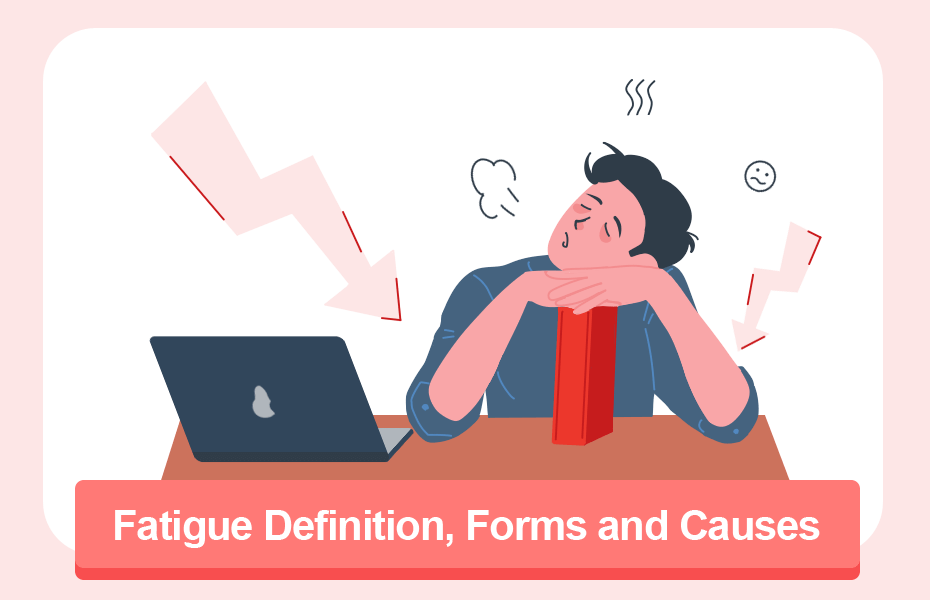Fatigue Definition, Forms and Causes
Don’t blame yourself for being tired all the time. Your condition may have serious root causes and be diagnosed as a fatigue. Sometimes it feels like drowsiness, muscle weakness, or lack of energy. Even though sleepiness can be a symptom of fatigue, those conditions are different. It is quite a normal situation when your eyes are closing after a hard day or sleepless night. Such a feeling is usually short-term, while the persistent tiredness and drowsiness usually mean a medical problem, especially chronic fatigue syndrome (further referred to as CFS).
Read the credible information about fatigue below: find out its forms, causes, and ways of treatment to learn how to distinguish a serious issue from a temporary question.
What Is Fatigue?
The general definition for fatigue is a constant low energy condition which may be accompanied by the strong desire to sleep, apathy, and body exhaustion. It reflects at physical, mental, or both levels at the same time depending on its cause.
Physical fatigue is an inability to accomplish daily tasks involving the muscles. A person suffering this type of symptom feels muscle weakness and a decline in physical strength.
Mental fatigue includes lack of concentration, sleepiness, and low level of consciousness. A patient’s brain doesn’t show normal cognitive performance.
Normally, any above-mentioned type of tiredness goes away after reducing an intense activity and having a rest. If the feeling lasts more than a couple of days, there is fatigue. In such cases, this thing prevents people from living a full life and makes them feel uncomfortable. As you can see, long-term fatigue is not an illness; it is a non-specific symptom of various medical conditions.
Even without being aware of what is fatigue, at least 20% of American people are experiencing it. Mental fatigue is more common than physical fatigue: their rates are estimated as 60% and 40%, respectively. A symptom is usually perceived subjectively by an affected person while staying invisible for others.
Not everybody notices fatigue because of its gradual onset. It is hard to compare the initial state of the body and the current feelings, particularly in elderly people. The individual may not know about his or her condition for ages before asking for medical help.
Fatigue Forms
The symptom may manifest itself in several forms or their combinations. Types of fatigue are classified according to its duration, severity, or sphere of influence. It varies from mild tiredness to extreme exhaustion with a general type of the disorder somewhere in the middle.
General Type
Overwork, lack of sleep and stress – either of these factors makes you feel fatigued normally. Deficiencies of energy are natural responses of the body to such circumstances. If you notice a minor illness, all you need is to recuperate at home and take your mind off the problems. This form of fatigue can be treated on your own and doesn’t require medical assistance.
The most frequent complaints from people having fatigue:
- difficulties in starting any activity;
- prompt fatigability while completing the daily chores;
- problems with concentration, learning and memorization.
Usually, the general kind is caused by a regular cold or hard work and lasts no longer than 2 weeks. There is nothing surprising. The energy reserves are depleted and the body needs time for recovery.
Severe Form
In case some signs of more severe condition’s development appear, contact your doctor. An individual who suffers from this type of fatigue doesn’t feel rested after sleeping or relaxing. He or she feels tired starting in the morning, continuing at the afternoon, and not ending in the evening. Possible symptoms the affected may experience:
- dizziness;
- body aches and headaches;
- loss of appetite;
- heart murmur;
- sweating;
- joint pain;
- slow reflexes;
- chills;
- nausea;
- poor vision.
Even the presence of one or two symptoms from the list above interferes with normal life. However, it is always hard to diagnose fatigue on your own because of a lot of non-specific signs which may be inherent to a variety of diseases. The best solution in cases of severe tiredness is to ask for medical help.
Extreme Fatigue
This kind of the condition is the most difficult for an affected person. An overwhelming fatigue may develop both gradually and suddenly, depending on a particular cause. Besides mentioned symptoms, an extreme type is also characterized by:
- loss of consciousness;
- near-syncope;
- vertigo;
- rapid or irregular heartbeat;
- memory impairment or brain fog;
- hallucinations.
If you are experiencing an extreme form of fatigue, immediately call the doctor or an emergency service. This condition may be life-threatening, especially if it occurs unexpectedly.
Chronic Type
Chronic fatigue syndrome, or CFS, is a prolonged feeling of a permanent lethargy which doesn’t go away after a good rest. A distinguishing feature of CFS is no explanation of such a condition: the fatigue causes are barely determined and are not connected with a medical problem. The disorder is also called myalgic encephalomyelitis (ME) or systemic exertion intolerance disease (SEID).
There is no general consensus on what causes fatigue of this type. The majority of experts agree that in most cases there is a combination of psychological and physiological factors, including a weakened immune system, hormones’ issues, anxiety, viral and bacterial infection, depression, or genetic predisposition.
Scientists have undertaken many studies on the connection between various viruses (Epstein-Barr virus, rubella, Ross River virus, human herpesvirus 6), bacteria (Coxiella burnetii, mycoplasma) and CFS. None of those organisms were defined as an obvious cause of this disorder.
CFS is usually accompanied by a weakening of the immune system and hormone imbalance (for instance, low testosterone in men or low progesterone in women). This is unclear whether it is the cause or just a consequent phenomenon.
However, statistics show that women in their 40s and 50s are in a group of risk among the adult population. It allows making an assumption about some relation between menopause and CFS. Teenagers are the most vulnerable to the syndrome among children.
CFS is often confused with common chronic fatigue. This kind of symptom will be described hereinafter as the persistent type. The condition claiming the title “CFS” should last more than 6 months and be not solvable by bedrest. It is debilitating enough to interfere with normal life and doesn’t have any obvious causes. In addition, a person affected by CFS suffers from at least four of the following symptoms:
- problems with concentration;
- loss of memory;
- sleep disorders such as insomnia;
- even too much sleep doesn’t bring relief;
- unreasonable joint and muscle chronic pain;
- headache;
- a frequent sore throat;
- swollen and painful lymph nodes.
Intense physical or mental activity often worsens the condition. CFS can manifest itself in cycles when the patient experiences remissions and relapses.
Mental Version
If you noticed:
- reduced productivity;
- difficulties with concentration and memorizing;
- loss of motivation and interest in working and hobbies;
- apathy;
- boredom;
- anxiety;
- impaired judgment and indecisiveness;
- mood swings;
- sleepiness.
For other symptoms related more to your psychological condition than to physical, you have a mental version of fatigue. It affects a person’s cognitive activity and leads to poor job performance, inability to solve intellectual challenges, and worsening of learning abilities. The most dangerous feature of mental fatigue is its gradual onset. The person can’t objectively assess his or her condition before and after the symptom appeared.
In some cases, mental fatigue can influence physical activities and lower strength and endurance. Common signs are drowsiness, lethargy, and muscle weakness.
The best solution to the problem is to stop the mental activity and create a comfortable environment around. Nevertheless, suddenly occurring extreme forms of such fatigue accompanied by vertigo, impaired speech, blurred vision, or loss of consciousness require an immediate medical assistance.
Persistent Type
A chronic type of fatigue or CFS may be also referred to as a persistent type. Even though these conditions have much in common, CFS is considered to be less understood and a more difficult disorder than simple persistent fatigue. This symptom is often a consequence of underlying reasons: diseases, medications, or allergies which can be easily diagnosed. They mold fatigue as a natural phenomenon of body exhaustion.
Prolonged fatigue turns into CFS when it has a duration of 6 months or longer. The causes of this syndrome remain unknown, unlike persistent tiredness. The symptoms inherent particularly to this kind of fatigue have been described in detail in the corresponding subparagraph.
The signs of a persistent type may be different depending on its causes, and they are similar to general type’s characteristics. The only difference: a chronic fatigue lasts longer and requires a special treatment while the duration of a persistent type is between 1 and 6 months.
What Causes Fatigue?
Fatigue is a symptom inherent to various medical conditions. Many drugs cause it as a side effect. Some physical and rare mental disorders also become a reason for fatigue emergence. That is why the patient should go through many examinations and tests before the initial issue in this particular case will be conclusively known. Everyone who feels fatigued needs to be aware of the most common causes of fatigue. It will simplify the diagnosis if you tell your doctor about your actions and feelings that preceded the condition.
Most Common Diseases
There are numerous answers to the question “What diseases cause fatigue?” The list of possible conditions related to fatigue consists of such categories:
- Metabolic and endocrine issues.
Metabolic disorders imply abnormal chemical reactions in the body and affect a human’s overall health. However, they usually remain undisclosed before the person starts to experience associated conditions which include fatigue. Problems with the endocrine system prevent normal hormone production and can cause significant changes in the body. In this category, there are the following causes of fatigue:
- kidney and liver diseases;
- diabetes and high blood sugar;
- anemia;
- hyperuricemia (abnormal secretion of uric acid and lactic acid);
- electrolyte problems;
- hypo- and hyperthyroidism (lack or abundance of thyroid cause fatigue);
- Cushing’s disease.
- Inflammation.
Viral and bacterial infections are always caused by harmful microorganisms.
Not all of infectious conditions cause fatigue, but it is a highly probable symptom of those:
- hepatitis;
- tuberculosis;
- sexually transmitted diseases (STDs);
- HPV (human papillomavirus);
- hay fever;
- BV (bacterial vaginosis);
- malaria;
- UTI (urinary tract infections);
- chlamydia and gonorrhea (both are STD);
- H.pylori infection;
- influenza;
- bladder infection;
- mononucleosis.
- Cardiac and pulmonary disorders.
Being connected to the heart and lungs, those diseases may cause sudden extreme fatigue which can’t be ignored. Pay attention to such conditions:
- congestive heart failure;
- high blood pressure or low blood pressure;
- chronic obstructive pulmonary disease (COPD);
- asthma;
- PVCS (premature ventricular contractions);
- beta blockers related disorders;
- pneumonia;
- bronchitis;
- mitral valve prolapse;
- coronary artery disease;
- arrhythmia;
- atrial fibrillation (AFib).
- Allergies.
Seasonal allergy can also manifest itself in tiredness, drowsiness, and a melancholy mood. Also, be careful while you feel weak after eating – it can be a precursor to various food allergies. In this case, you should avoid products that make you feel bad. A spring allergy is an inevitable thing for some people. If you feel fatigued during this period, try to take special medicines for allergies and supplements which contain necessary vitamins and minerals for facilitating your health.
- Mental disorders.
Often fatigue can result from depression, anxiety, alcohol and drug abuse, grief, and so on. The treatment of mental conditions should be supported by the psychologist’s consultations.
- Sleep problems.
If a person doesn’t have a normal sleep for a long time, it will be translated into malaise. This process is natural when you give it up it by choice, but some people can’t sleep well due to such disorders and conditions as:
- sleep apnea;
- insomnia;
- reflux esophagitis;
- night shifts;
- jet lag.
There are also other diseases and problems that can’t be included in the one category but are also able to cause fatigue:
- cancer;
- fibromyalgia;
- endometriosis;
- ulcers;
- gastritis;
- acid reflux;
- obesity;
- IBS (irritable bowel syndrome);
- chronic pain;
- deviated septum;
- wisdom teeth growth or tooth decay;
- inner ear problems.
Some of them give such side effects rarely. For instance, only several people reported about it while suffering from gastritis or endometriosis.
- Blood issues.
Changes in the blood content such as abnormal white blood cell count, deficiency of platelets, low ferritin, low oxygen, or high glucose are common companions of fatigue.
Rare Disorders Caused by Fatigue
Rare autoimmune disorders like Celiac disease (gluten intolerance), chronic lymphocytic thyroiditis, osteoarthritis, systemic lupus, and psoriasis can also cause persistent fatigue.
What Medications Cause Fatigue?
Many prescription and over-the-counter drugs have a fatigue side effect in their instructions. This happens due to neurotransmitters’ affection. Those chemicals are responsible for feelings of cheerfulness or sleepiness, but after taking certain medicines their normal functioning is violated.
Therefore, fatigue is caused by:
- allergy medications or antihistamines: Vistaril, Atarax, Antivert, Bromfed, Dimetapp;
- antidepressants: Elavil, Vanatrip, Silenor, Sinequan, Surmontil, Wellbutrin, Zoloft;
- anxiety drugs: Lexapro, Xanax, Valium;
- blood thinners: Warfarin, Coumadin;
- antibiotics: Flagyl, doxycycline, Amoxicillin, Augmentin;
- drugs for high cholesterol and high triglycerides: Crestor, Statins, Lipitor;
- medications for Crohn’s disease: Humira;
- sugar-lowering remedies: Metformin;
- ulcerative colitis drugs: Prednisone;
- cancer medications: methotrexate, Tamoxifen, arimidex;
- high blood pressure drugs: lisinopril, metoprolol;
- contraceptive products: mirena, Nuvaring;
- muscle relaxants: Soma, Flexeril;
- lactose intolerance drugs: Lactaid, SureLuc;
- opioid pain medications: Percocet, Opana, Vicodin.
This list is not full, so if you buy a medicine, read the information on the package before taking it. One of the possible side effects can be fatigue.
It is worth noting that fatigue may be caused by a deficiency of some essential elements. If your body lacks vitamin D and/or, iron or suffers from low potassium, low calcium, low sodium levels, and dehydration, do not wonder why you are feeling exhausted.
Similar conditions may appear due to smoking or even while quitting smoking. Another reason for weakness may be a caffeine overdose instead of good sleep. You should know that when coffee wears off, you will feel even more tired than you did before drinking it.
What Can Cause Fatigue Condition?
Lightheadedness
There is strong link between lightheadedness and fatigue. So, the response to the question “Can fatigue cause lightheadedness?” is obviously yes. Dizziness is a condition when a person doesn’t faint but feels unstable. Sometimes, it seems that you are losing the ground under your feet. It’s common to feel this way when you are tired or sleepy.
Nausea
Does fatigue cause nausea? It is not a common reaction in sleepiness but there are many people that experience both nausea and exhaustion at the same time. The main causes of such conditions are:
- excessive alcohol or caffeine use;
- junk food;
- jet lag;
- drug abuse;
- use of particular medications with those side effects.
Panic Attacks
Panic attacks often accompany fatigue within depression, anxiety, stress, grief, and other psychologically uncomfortable medical conditions. Also, they can be related to nervous system problems.
Vertigo
The main difference of vertigo, if comparing it to lightheadedness, is that the first one appears while the affected person is staying still. The second may be perceived only in the process of movement. Vertigo is a feeling of spinning when you are not moving. Usually, it combines with fatigue when you have:
- low blood sugar;
- low blood pressure;
- anemia;
- migraines;
- CFS;
- BPPV (benign paroxysmal positional vertigo).
Do Smart Drugs Help for Fatigue?
Even though there are medications for specific fatigue causes (such as levothyroxine), drugs such as Modafinil, Armodafinil, Provigil, and Artvigil are usually used for chronic fatigue treatment in general. Additionally, you can take probiotics and rhodiola which are the natural remedies for tiredness and lack of vital energy.
You can buy above-mentioned medications in Modafinil online pharmacy without a prescription. We provide fast delivery across the USA: you will receive your package within 7-10 days via express shipment and 10-18 via the regular one. Pay for the orders using bitcoins and get a 20% discount.















